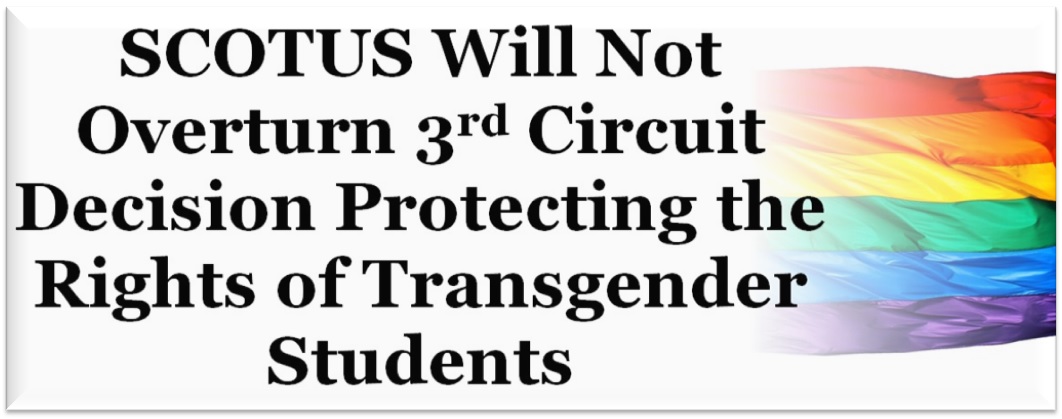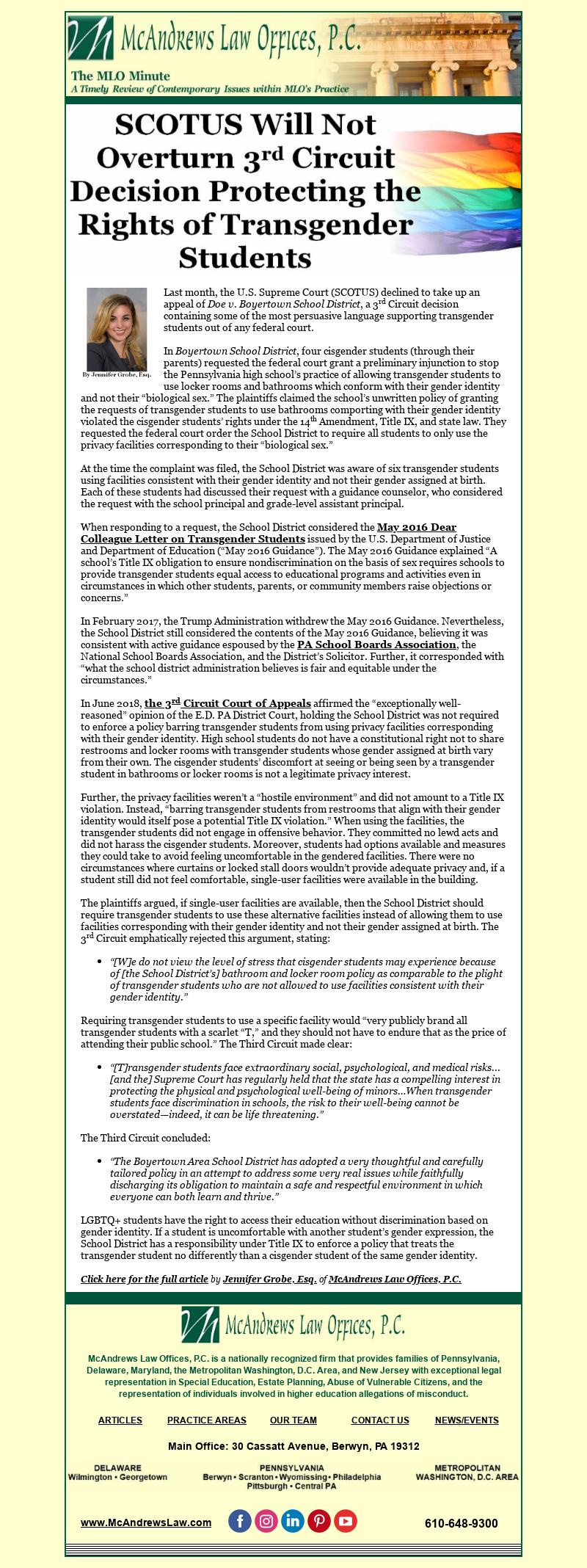June 2019
The MLO Minute, By Jennifer Grobe, Esq. of McAndrews Law Offices, P.C.
Last month, the U.S. Supreme Court (SCOTUS) declined to take up an appeal of Doe v. Boyertown School District, a 3rd Circuit decision containing some of the most persuasive language supporting transgender students out of any federal court.
In Boyertown School District, four cisgender students (through their parents) requested the federal court grant a preliminary injunction to stop the Pennsylvania high school’s practice of allowing transgender students to use locker rooms and bathrooms which conform with their gender identity and not their “biological sex.” The plaintiffs claimed the school’s unwritten policy of granting the requests of transgender students to use bathrooms comporting with their gender identity violated the cisgender students’ rights under the 14th Amendment, Title IX, and state law. They requested the federal court order the School District to require all students to only use the privacy facilities corresponding to their “biological sex.”
At the time the complaint was filed, the School District was aware of six transgender students using facilities consistent with their gender identity and not their gender assigned at birth. Each of these students had discussed their request with a guidance counselor, who considered the request with the school principal and grade-level assistant principal.
When responding to a request, the School District considered the May 2016 Dear Colleague Letter on Transgender Students issued by the U.S. Department of Justice and Department of Education (“May 2016 Guidance”). The May 2016 Guidance explained “A school’s Title IX obligation to ensure nondiscrimination on the basis of sex requires schools to provide transgender students equal access to educational programs and activities even in circumstances in which other students, parents, or community members raise objections or concerns.”
In February 2017, the Trump Administration withdrew the May 2016 Guidance. Nevertheless, the School District still considered the contents of the May 2016 Guidance, believing it was consistent with active guidance espoused by the PA School Boards Association, the National School Boards Association, and the District’s Solicitor. Further, it corresponded with “what the school district administration believes is fair and equitable under the circumstances.”
In June 2018, the 3rd Circuit Court of Appeals affirmed the “exceptionally well-reasoned” opinion of the E.D. PA District Court, holding the School District was not required to enforce a policy barring transgender students from using privacy facilities corresponding with their gender identity. High school students do not have a constitutional right not to share restrooms and locker rooms with transgender students whose gender assigned at birth vary from their own. The cisgender students’ discomfort at seeing or being seen by a transgender student in bathrooms or locker rooms is not a legitimate privacy interest.
Further, the privacy facilities weren’t a “hostile environment” and did not amount to a Title IX violation. Instead, “barring transgender students from restrooms that align with their gender identity would itself pose a potential Title IX violation.” When using the facilities, the transgender students did not engage in offensive behavior. They committed no lewd acts and did not harass the cisgender students. Moreover, students had options available and measures they could take to avoid feeling uncomfortable in the gendered facilities. There were no circumstances where curtains or locked stall doors wouldn’t provide adequate privacy and, if a student still did not feel comfortable, single-user facilities were available in the building.
The plaintiffs argued, if single-user facilities are available, then the School District should require transgender students to use these alternative facilities instead of allowing them to use facilities corresponding with their gender identity and not their gender assigned at birth. The 3rd Circuit emphatically rejected this argument, stating:
“[W]e do not view the level of stress that cisgender students may experience because of [the School District’s] bathroom and locker room policy as comparable to the plight of transgender students who are not allowed to use facilities consistent with their gender identity.”
Requiring transgender students to use a specific facility would “very publicly brand all transgender students with a scarlet “T,” and they should not have to endure that as the price of attending their public school.” The Third Circuit made clear:
“[T]ransgender students face extraordinary social, psychological, and medical risks…[and the] Supreme Court has regularly held that the state has a compelling interest in protecting the physical and psychological well-being of minors…When transgender students face discrimination in schools, the risk to their well-being cannot be overstated—indeed, it can be life threatening.”
The Third Circuit concluded:
“The Boyertown Area School District has adopted a very thoughtful and carefully tailored policy in an attempt to address some very real issues while faithfully discharging its obligation to maintain a safe and respectful environment in which everyone can both learn and thrive.”
LGBTQ+ students have the right to access their education without discrimination based on gender identity. If a student is uncomfortable with another student’s gender expression, the School District has a responsibility under Title IX to enforce a policy that treats the transgender student no differently than a cisgender student of the same gender identity.





